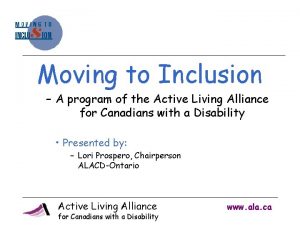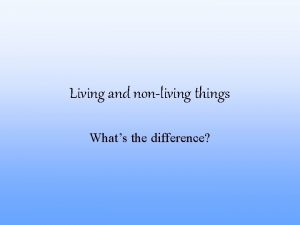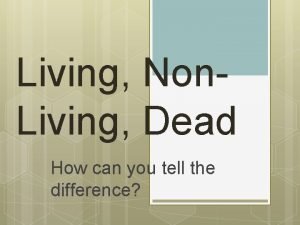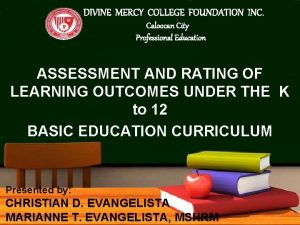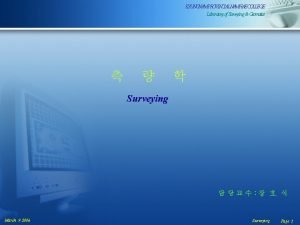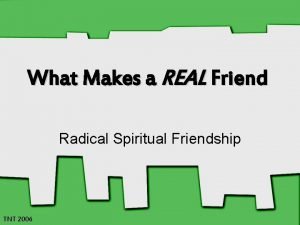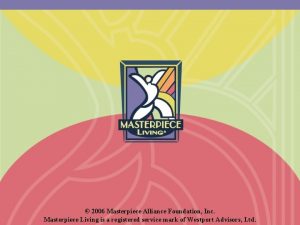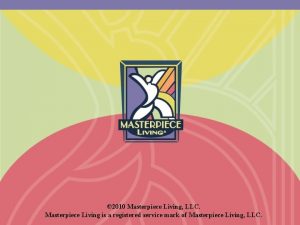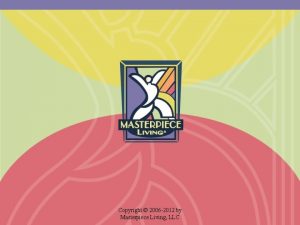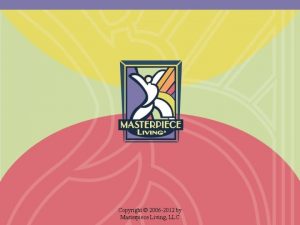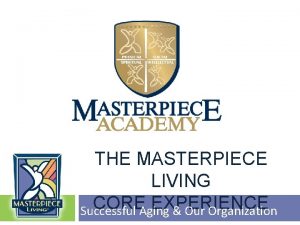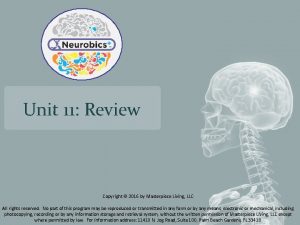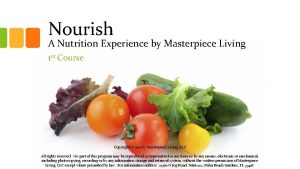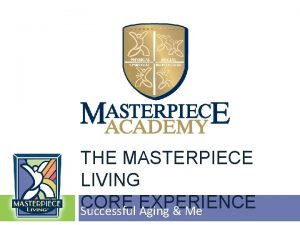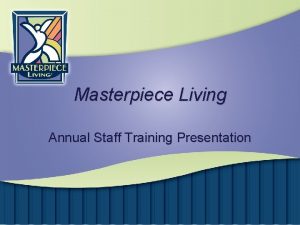2006 Masterpiece Alliance Foundation Inc Masterpiece Living is





























- Slides: 29

© 2006 Masterpiece Alliance Foundation, Inc. Masterpiece Living is a registered service mark of Westport Advisors, Ltd.

Testing Your Aging IQ: Are You an Expert or an Ageist?

What You Will Learn • Facts about older adults and aging. • Clarification of misunderstood perceptions, negative views and stereotypes of aging, sometimes referred to as “ageism. ” • How ageism can affect the residents of our community and other older adults. • How to overcome ageism and better facilitate the successful aging of the residents of our community.

What’s Your Aging IQ? Take this quiz and find out!

What’s Your Aging IQ? Question #1: Most people will become “senile” sooner or later if they live long enough. TRUE X FALSE

What’s Your Aging IQ? Question #2: Intelligence declines with age. TRUE X FALSE

What’s Your Aging IQ? Question #3: Most older adults have little interest in or capacity for sexual relations. TRUE X FALSE

What’s Your Aging IQ? Question #4: At least 25% of all older adults live in nursing homes. TRUE X FALSE

What’s Your Aging IQ? Question #5: Older drivers have more automobile accidents than younger drivers. TRUE X FALSE

What’s Your Aging IQ? Question #6: Depression is a common problem for many older adults. X TRUE FALSE

What’s Your Aging IQ? Question #7: Older people tend to become more religious as they age. TRUE X FALSE

What’s Your Aging IQ? Question #8: The majority of older adults are socially isolated and lonely. TRUE X FALSE

What’s Your Aging IQ? Question #9: Older adults represent the age group at most risk for suicide. X TRUE FALSE

What’s Your Aging IQ? Question #10: Older adults have more acute, shortterm illnesses than younger people. TRUE X FALSE

What’s Your Aging IQ? Question #11: Older adults naturally withdraw from participation in community life as they age. TRUE X FALSE

What’s Your Aging IQ? How Did You Do? 10 – 11 correct = Expert 7 – 9 correct = Proficient 1 – 6 correct = Novice (for now)

Boosting Your Aging IQ • Read Successful Aging. • Get involved with Masterpiece Living. • Visit: www. Masterpiece. Living. Mayo. Clinic. com • Ask RESIDENTS what they want you to know about them!

Why Is Aging IQ Important? • What we don’t know CAN hurt us and our residents. • Not knowing or misunderstanding breeds ageism, whether intentional or subconscious.

Understanding Ageism: A Group Exercise • Divide into groups of three to five people. • Each group develops a list of five negative beliefs and five positive beliefs about older people. • Group discussion.

Some Common Views Aging Positive Views On Negative Views • Experienced & knowledgeable • Crotchety • Appreciative • Set in ways • Wise • Cheap (frugal to a fault) • Great story tellers • Poor hygiene • Reminds me of my mother/father • Demanding • Stone age racist How do we know what is true and what isn’t?

What Is Ageism? A stereotypical and often negative bias against older adults.

How Ageism Is Perpetuated Where have you seen ageism? • On TV? • In greeting cards? • In our health care system? • Among older adults themselves? • What are some other examples?

Examples of Ageism Inside Card: Your eyesight is gone!

The Effects of Ageism • Is there a relationship between what we believe about older people and how we treat them? • What impact could ageism have on how older adults see themselves?

How Can We Reduce Ageism? • Be aware of it when you see it. • Help others become more sensitive to ageism.

How Can We Reduce Ageism? • If you encounter ageism, use the opportunity to alter the stereotype. • Always be respectful, polite and positive toward older adults. • Work every day toward the empowerment of older adults.

Group Exercise: Ageism Interactions As you plan your response, consider: • Is this ageism? • What is a more appropriate or accurate message, and how would you share it under these circumstances? • How does this scenario relate to Masterpiece Living? • How can my interaction with this person promote successful aging?

Summary • We know a lot about aging, but there are still many misunderstandings and negative stereotypes. • Misinformation leads to ageism, which is destructive to older adults and our society. • We can end ageism in our communities by having the courage to confront it and promoting successful aging.

Questions & Discussion
 You invest in the divinity of the masterpiece meaning
You invest in the divinity of the masterpiece meaning You invest in the divinity of the masterpiece analysis
You invest in the divinity of the masterpiece analysis Active living alliance
Active living alliance Composition of urine
Composition of urine Pad foundation section
Pad foundation section What is the smallest living unit in all organisms?
What is the smallest living unit in all organisms? Venn diagram living and non living
Venn diagram living and non living Yeast is living or nonliving
Yeast is living or nonliving Living non living dead
Living non living dead Divine mercy caloocan
Divine mercy caloocan Public health foundation enterprises inc
Public health foundation enterprises inc Http://sciencespot.net/
Http://sciencespot.net/ Jane eyre cast
Jane eyre cast 09 juli 2006
09 juli 2006 Luthans 2006
Luthans 2006 March 9, 2006
March 9, 2006 King of fighters 2006
King of fighters 2006 A real friend 2006
A real friend 2006 Vbe vertinimo lentele
Vbe vertinimo lentele Jost 2006
Jost 2006 2006 kids
2006 kids Sni amdk 2015
Sni amdk 2015 Monarch awards 2006
Monarch awards 2006 Ckm 2006
Ckm 2006 Gudi padwa 2005
Gudi padwa 2005 T. trimpe 2003 http://sciencespot.net/
T. trimpe 2003 http://sciencespot.net/ Copyright 2006
Copyright 2006 2006 emo
2006 emo T.trimpe 2006 http sciencespot.net
T.trimpe 2006 http sciencespot.net 2006
2006


